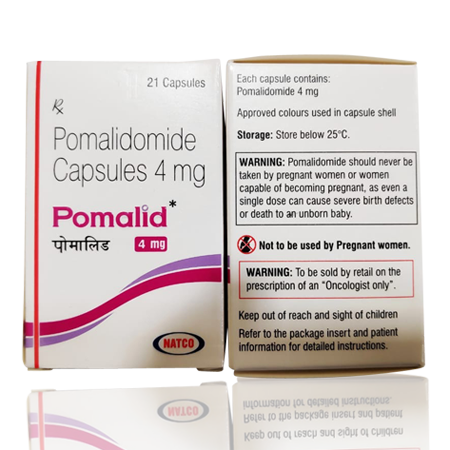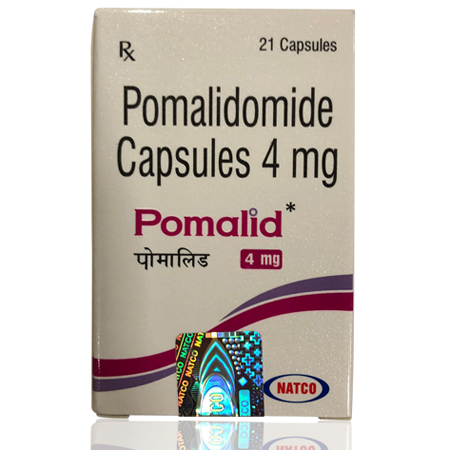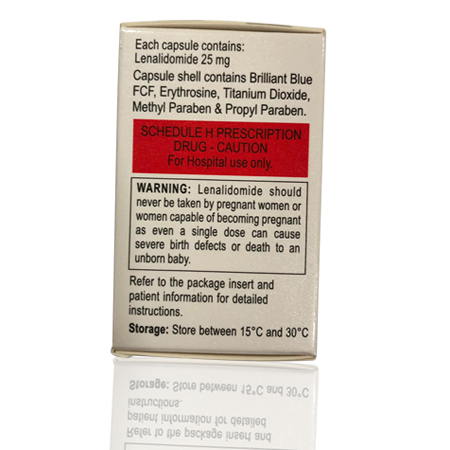 Introduction
IntroductionWhat POMALID 4MG is used for?
- It is used to treat adults with a type of cancer called multiple myeloma
 Warning & Precautions
Warning & PrecautionsTalk to Doctor
Talk to your doctor before you take this medicine, if you:
- Are allergic to any of the other ingredients of this medicine
- Have ever had blood clots in the past
- Have had a heart attack, heart failure
- Have difficulty breathing
- Are smoker
- Have high blood pressure or high cholesterol levels
- Have a high total amount of tumor throughout the body, including your bone marrow
- Have or have had neuropathy
- Have or have ever had hepatitis B infection
Pregnancy & Breast Feeding
- If you are pregnant or breastfeeding think you may be pregnant or are planning to have a baby, ask your doctor for advice before taking this medicine
Children & Adolescents
- It is not recommended for use in children and young people under 18 years
Driving & Using Machines
- You may feel tired, dizzy, faint, confused or less alert when taking Pomalidomide. If this happens to you, do not drive or operate tools or machinery
 Interactions
InteractionsTell your doctor if you are taking,
- Ketoconazole (used to treat fungal infection)
- Ciprofloxacin, enoxacin (used to treat infection)
- Fluvoxamine (used to treat depression)
 How to Use
How to Use- Always take this medicine exactly as your doctor has told you
- Do not break, open or chew this medicine
- Swallow the medicine whole, preferably with water
If you take more?POMALID 4MG
- If you take more POMALID 4MG than you should, talk to a doctor or go to nearest hospital? immediately
If you forget to take?POMALID 4MG
- If you forget to take POMALID 4MG on a day when you should, take your next medicine as normal the next day. Do not increase the number of medicine you take to make up for not taking?POMALID 4MG the previous day
If you stop taking?POMALID 4MG
- Do not stop taking this medicine unless your doctor tells you to do so
 Side Effects
Side EffectsLike all medicines, this medicine can cause side effects, although not everybody gets them
Serious
- Nosebleeds and bleeding from the bowels or stomach (due to effects on blood cells called platelets)
- Rapid breathing, rapid pulse, fever and chills, passing very little to no urine, nausea and vomiting, confusion, unconsciousness (due to infection of blood called sepsis or septic shock)
- Severe, persistent or bloody diarrhoea (possibly with stomach pain or fever)
- Chest pain, or leg pain and swelling, especially in your lower leg or calves
- Shortness of breath (serious chest infection, inflammation of the lung, heart failure or blood clot)
- Swelling of face, lips, tongue and throat, difficulty breathing (due to a serious type of allergic reaction called angioedema)
- Certain types of skin cancer (squamous cell carcinoma and basal cell carcinoma) changes in the appearance of your skin or growths on your skin
Common
- Shortness of breath (dyspnea)
- Pneumonia and bronchitis
- Infections of nose, sinuses and throat
- Tiredness and weakness due to anaemia
- High blood levels of sugar
- Loss of appetite
- Constipation, diarrhoea or nausea, vomiting
- Difficulty in falling asleep or staying asleep
- Dizziness, tremor
- Muscle spasm, muscle weakness
- Bone pain, back pain
- Numbness, tingling or burning sensation to the skin, pains in hands or feet (peripheral sensory neuropathy)
- Swelling of the body, including swelling of the arms or legs
- Fall, bleeding within the skull
- Decreased ability to move or feel (sensation) in your hands, arms, feet and legs because of nerve damage (peripheral sensorimotor neuropathy)
- Numbness, itching, and a feeling of pins and needles on your skin
- Swelling caused by fluid
- Hives (urticaria)
- Itchy skin, shingles
- Chest pain, chest infection
- Decreased number of blood cells
- Tingling of hands, feet, or lips, muscle cramps, muscle weakness, light-headedness, confusion
- Abnormal heart rhythm
- Muscle twitching, fits (epileptic seizures)
- Dizziness or fainting
- Abdominal pain, swollen abdomen
- Feeling down (depressed mood)
- Clouding of your eye (cataract)
- Burning sensation need to pass urine more often
- Pain in the pelvis
- Weight loss
Uncommon
- Stroke
- Itchy skin, yellowing of the skin
- Pale colored stools
- Dark colored urine
- Abdominal pain
- Tumor lysis syndrome
 More Information
More InformationStorage
- Keep this medicine out of reach of children
- Store at room temperature (15-25°C)
- Do not use this medicine after the expiry date
 Disclaimer:
Disclaimer:The contents of this website are for informational purposes only and not intended to be a substitute for professional medical advice, diagnosis, or treatment. Please seek the advice of a physician or other qualified health provider with any questions you may have regarding a medical condition. Do not disregard professional medical advice or delay in seeking it because of something you have read on this website.
PRODUCT DETAILS
ALTERNATE BRANDS View All
The contents of this website are for informational purposes only and not intended to be a substitute for professional medical advice, diagnosis, or treatment. Please seek the advice of a physician or other qualified health provider with any questions you may have regarding a medical condition. Do not disregard professional medical advice or delay in seeking it because of something you have read on this website.










